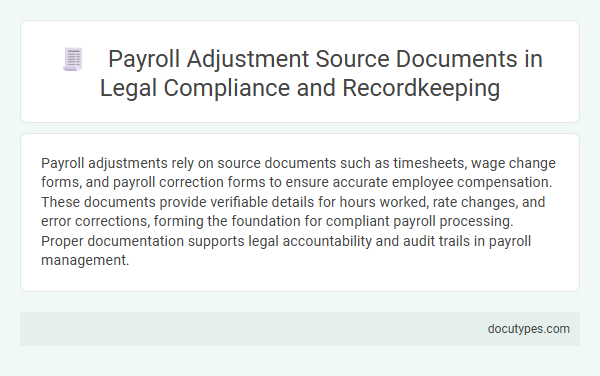Payroll adjustments rely on source documents such as timesheets, wage change forms, and payroll correction forms to ensure accurate employee compensation. These documents provide verifiable details for hours worked, rate changes, and error corrections, forming the foundation for compliant payroll processing. Proper documentation supports legal accountability and audit trails in payroll management.
Introduction to Payroll Adjustment Source Documents
Which forms serve as source documents for payroll adjustments? Payroll adjustment source documents include time sheets, wage change forms, and leave request forms. These documents provide accurate information to ensure precise payroll processing and compliance with labor regulations.
Importance of Payroll Adjustments in Legal Compliance
Payroll adjustments are essential for ensuring accurate employee compensation and maintaining legal compliance with labor laws. Source documents such as timesheets, wage change forms, and tax withholding certificates serve as primary evidence for these adjustments.
Maintaining proper documentation for payroll adjustments helps organizations avoid legal penalties and disputes related to wage payments. Forms like overtime records and deduction authorizations provide a clear audit trail for regulatory reviews. Accurate payroll records support transparency and protect both employers and employees in legal compliance matters.
Key Types of Payroll Adjustment Source Documents
Key types of payroll adjustment source documents include time correction forms, wage adjustment requests, and bonus authorization forms. These documents serve as the foundation for modifying employee wage records accurately and ensure compliance with labor laws. Proper documentation helps maintain transparent payroll processes and supports audit trails in legal and financial reviews.
Legal Requirements for Payroll Recordkeeping
Legal requirements for payroll recordkeeping mandate specific source documents for payroll adjustments to ensure compliance and accuracy. Maintaining these documents is essential for audits and resolving disputes.
- Timesheets and Attendance Records - These documents verify hours worked and support wage adjustments such as overtime or leave payout.
- Pay Adjustment Forms - Official forms authorize changes in salary, bonuses, or deductions and provide legal proof for payroll changes.
- Tax Forms and Deduction Authorizations - Documents like W-4 and garnishment orders serve as legal evidence for withholding adjustments and compliance with tax laws.
Common Payroll Adjustment Scenarios
Payroll adjustments require accurate source documents to ensure legal compliance and correct employee compensation. Common scenarios include changes in hours worked, benefits deductions, and tax withholding updates.
- Timesheets - Document actual hours worked to adjust wages based on overtime or missed shifts.
- Benefit Enrollment Forms - Record employee elections or changes in health insurance and retirement contributions.
- Tax Withholding Certificates - Reflect updates in federal or state tax exemptions affecting payroll deductions.
Verification and Authorization Procedures
Source documents for payroll adjustments primarily include timesheets, employee change forms, and payroll adjustment requests. Verification involves cross-checking these documents against attendance records and employment contracts to ensure accuracy. Authorization requires approval from designated supervisors or HR personnel to validate and implement the adjustments in the payroll system.
Retention Periods for Payroll Adjustment Documents
Payroll adjustment documents originate from various forms, including timesheets, wage change authorizations, and correction slips. These source documents capture details necessary for accurate payroll processing and record-keeping.
Retention periods for payroll adjustment documents typically range from 3 to 7 years, depending on jurisdiction and regulatory requirements. Maintaining these records ensures compliance with labor laws, tax regulations, and audit readiness.
Audit Trails and Documentation Integrity
Payroll adjustments require accurate source documents to ensure audit trails and maintain documentation integrity. Proper forms support compliance and facilitate verification during legal and financial audits.
- Time Sheets - Time sheets provide detailed records of employee hours that justify payroll modifications.
- Pay Change Authorization Forms - These forms document official approvals for salary or wage adjustments.
- Expense Reimbursement Vouchers - Vouchers verify additional payments related to business expenses eligible for payroll inclusion.
Maintaining these source documents preserves transparency and supports legal compliance in payroll processing.
Penalties for Non-compliance in Payroll Recordkeeping
Payroll adjustments require accurate source documents such as wage notices, timesheets, and correction forms. These documents verify changes in hours worked, rates of pay, or deductions necessary for compliant payroll processing.
Penalties for non-compliance in payroll recordkeeping can include fines and legal actions imposed by labor authorities. You must maintain detailed and accurate payroll records to avoid financial and legal consequences.
Which Forms Serve as Source Documents for Payroll Adjustments? Infographic

